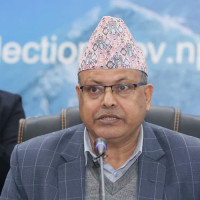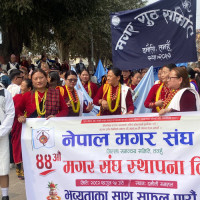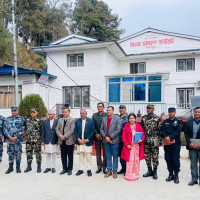- Friday, 27 February 2026
Knowledge, Information And Media
There is a popular saying: ‘knowledge is power.’ This aphorism carries the eternal verity that humanity has been embracing for centuries. The importance of knowledge has gained prominence as it has enabled scientific discoveries and technological innovation, bringing quantitative and qualitative transformation to the lives of people. During the Renaissance, the frontiers of knowledge expanded the realms of the Humanities, Science and Commerce and took civilisation to a newer stage. The power of knowledge continues to guide the people throughout history to attain happiness, peace and prosperity.
Come the 20th century, the term ‘knowledge’ was replaced by ‘information’, thanks to the Information Revolution that has brought seismic changes across the world. With the proliferation of the internet, information has been digitised and become readily available to a wider segment of the population. This has drastically altered the communication pattern: how people work, behave and communicate with each other. The rapid flow of information and its instant impact on people have led to the decentralisation of power, the promotion of transparency and the spread of democratic consciousness among the citizens at an unprecedented level.
Informed decisions
Nowadays, information has become a power because informed decisions are crucial for success in individual and professional life. Misinformation brings opposite results and leads to a disastrous course. The media is the first port of call for information and news. Be it print, television, radio or digital media, their primary responsibility is to disseminate correct information to the people. A truthful and credible flow of information contributes to meaningful communication and democratic nation-building. If media institutions are swayed by commercial and partisan interests, they fail to provide the right information, depriving them of serving the citizenry.
In addition to the flow of information, the media plays a critical role in forming public views by publishing news analyses, feature stories and opinion articles under a certain policy framework. In doing so, the media outlets get engaged in consent manufacturing, narrative setting, agenda building and labelling in line with dominant ideology and power structures with which they are associated. Innocent readers and viewers take them for granted, while the perceptive minds understand the hidden motives, policies and interests of media outlets and agencies by perusing them between the lines.
In an age of social media, people are bombarded with information that is supplied on a minute-by-minute basis. What is more worrying is that readers'/viewers' newsfeeds are filled with misinformation, disinformation and fake news. This risks them being carried away by the mala fide news, as they lack the necessary tools to avoid and combat fake information. This is indeed a big challenge for the digitally connected modern society.
As we are marking the 125th anniversary of Gorkhapatra, a pioneering Nepali vernacular daily, it is prudent to take a deeper look at the evolving nature of journalism – its strengths and weaknesses and the danger it is facing. Gorkhapatra has been a mouthpiece of the government since its inception. For all its shortcomings, Gorkhapatra and its sister publications have not come under the influence of commercial interest and foreign manipulation. As a public media house, it is free from many of the anomalies that are infecting other media houses. As it nurtures diverse cultures and languages, it has become national identity and heritage.
Media is also a cultural industry that promotes and projects soft power and national identity, so the foreign funding and manipulation in the domestic media should be kept at bay. Recently, vexing news has come to the fore: NGOs/INGOs are investing in various Nepali media outlets to promote deep state actors active in imposing their agenda and destabilising the state if they pose an obstacle to their mission.
To combat disinformation and fake news, the media outlets should embrace ethical standards and a code of conduct. However, the ethical principles of journalism should be internalised and must come from inside the journalists; they should not be imposed from outside. It is because journalists are the highly conscious persons, as they have all the information at their fingertips. Only then can the society expect accurate and fair news from them.
Against this backdrop, Gorkhapatra’s contribution to introducing and enforcing media ethics was historic and worth emulating at home and abroad. Rana prime minister Dev Shumsher, who founded Gorkhapatra on May 6, 1901, issued a sanad (decree), giving directives to the editorial team as to what should be published and what not in the newspaper. “It should not publish our (the prime minister’s) praise and plaudits,” states the sanad. In modern day, some media companies, either funded by businesspersons or operated on public money, have become so powerful that they can tip the scales of national politics to meet their vested interests. And they require embracing ethical principles to check possible abuse of media power for undue benefits.
Corridors of power
Foreign-funded media houses that are inclined to spread fabricated information will not eventually serve the national interest and well-being of citizens. The vision of the reformist prime minister runs counters to such media outlets that are engaged in journalism practice behind the façade of press freedom and human rights. They are blamed for manufacturing consent in favour of a handful of business and political elites. In the West, the corporate media is ruling the roost. They serve the interests of the Western governments through narrative building and sometimes distorting the truth. Alternative views and ideas are often suppressed and looked down upon.
Information and communication technology has enabled the storage and processing of a vast amount of information. Transforming information and facts into practice shapes knowledge. For this, information is processed and analysed for better understanding, perspective and insights. Gorkhapatra has the institutional ability to collect and publish accurate information. If the media outlets are involved in spreading misinformation, the knowledge formation process will take a back seat because it is not created on the foundation of lies and false information. In that sense, Gorkhpatra’s contribution is not merely confined to the flow of fact-based information but also to the creation of knowledge. This lofty role of Gorkhapatra is more pronounced as the knowledge society is fast emerging in the ever-shrinking world.
(The author is deputy executive editor of this daily.)
















